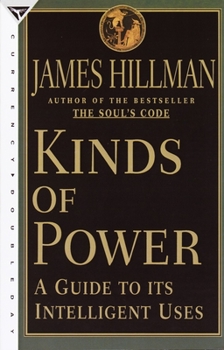Kinds of Power: A Guide to its Intelligent Uses
Select Format
Select Condition 
Book Overview
In the boldest expose on the nature of power since Machiavelli, celebrated Jungian therapist James Hillman shows how the artful leader uses each of two dozen kinds of power with finesse and subtlety. Power, we often forget, has many faces, many different expressions. "Empowerment," writes best-selling Jungian analyst James Hillman, "comes from understanding the widest spectrum of possibilities for embracing power." If food means only meat and potatoes,...
Format:Paperback
Language:English
ISBN:0385489676
ISBN13:9780385489676
Release Date:January 1997
Publisher:Broadway Business
Length:272 Pages
Weight:1.95 lbs.
Dimensions:0.7" x 5.7" x 8.5"
Related Subjects
Business Business & Investing Economics Health, Fitness & Dieting Health, Fitness & Dieting Leadership Management & Leadership Occupational & Organizational Politics & Social Sciences Psychology Psychology & Counseling Self Help Self-Help Self-Help & Psychology Social Science Social Sciences SuccessCustomer Reviews
5 ratings
Very enlightening, with a caveat...
Published by Thriftbooks.com User , 15 years ago
Elucidates power very well. This book really, really opened my eyes that way. Power, and its specific types, are concepts that all of us are very familiar with, and have to be. Verbalizing those concepts and their intricacies makes for clearer thought and more powerful action. The author writes very clearly and simply. My caveat comes from my background of believing in evolution and sociobiology. There are parts of the book that the author deals with what he calls 'archetypology', which is basically an attempt to explain power at a more profound level of abstraction. His archetypology uses the pre-Christian, Greek gods and goddesses. I would archetype things myself differently, and thus found that part of the book not very useful. Five stars nonetheless, for the pros heavily outweigh the cons. Great work!
thought-provoking for leadership wonks
Published by Thriftbooks.com User , 19 years ago
One my most-recommended books whenever discussions about "leadership" or "control" go sideways. Flawed, but discerning readers can extract real-life applications of the models and metaphors herein. Worthy of updating and reissuing with a new market positioning that will expand its audience beyond psychoanalytical circles.
Power corrupts, or does it?
Published by Thriftbooks.com User , 21 years ago
James Hillman is often thought of as a demanding and difficult writer -- in need of being "popularized" by someone like Thomas Moore ("Care of the Soul") to reach a wider audience. And there may be some truth to this, but Hillman can also be remarkably accessible, as in this thought-provoking book on the "intelligent uses" of power.We may think that power needs no explanation. It is what it is. But, as Hillman points out, that belief gives it unconscoius power over us. Never examining power, we do not see the many ways it permeates our daily lives, influencing our behavior and our choices. If we think of power as "force," we do not appreciate its subtler uses, e.g., influence, authority, or energy, and we do not see that problems about power may have a wide array of solutions.Hillman is fascinated by words, because words represent ideas; embedded in words are the entire histories of ideas. He is also fascinated by the process of "entertaining" ideas, and this book is a record of one brilliant and mercurial mind entertaining the idea of power, examining the many ways we can look at it (he devotes a chapter to each of 24 "kinds of power"), as well as the way its various meanings govern how we see the world around us. For instance, ideas about power lead individuals or groups of people to regard themselves as disempowered (victims); ideas about power may underlie the desire to own guns.Because economic power rules the lives of almost everyone (yet another idea about power), Hillman directs his book to anyone involved with businesss. And he means business in the broadest sense of that word -- anyone whose life is structured by the getting and spending of money. Looking into mythology for insights into the psychology of power, he opens up this subject as therapist and patient might do in a series of 50-minute sessions. It's not a how-to book, but rather a journey, taking the reader across a landscape (both personal and collective) that offers many new and freeing perspectives.
The Power of Ideas
Published by Thriftbooks.com User , 24 years ago
Hillman contends that power is not a single entity. There are many forms of power. Hillman describes a wide variety of powers, such as control, ambition, leadership, charisma, tyranny and many more. Hillman gives the reader a different perspective on each form of power. He does not judge certain types of power as being good or bad. He helps us see each kind in a new light. It is Hillman's premise that power resides in our ideas about power. We are ruled by the power of ideas. If we are to become more effective as leaders and managers, we must become aware of how we think about power. No one definition of power is adequate. We must recognize that power is multifaceted and we must be prepared to exercise power in its many forms if we are to succeed.
Hillman is authoritative, erudite and comprehensive.
Published by Thriftbooks.com User , 24 years ago
James Hillman's book Kinds of Power, srikes a chord of resonance at every root "chakra" in the human body. Two dozen associates under the rubric of "power" are brought to bear upon the reader. Hillman appears to "make up" his analysis as he goes along, but, with his intellect and breadth of pedantic knowledge, he stays a steady course from start to finish. Hillman is convincing, forever analytical and sufficiently critical. He does have a way of getting off the path at times and entertains his way through some tough issues by employing a bit of sophism. Nonetheless, overall, a book well worth reading.




